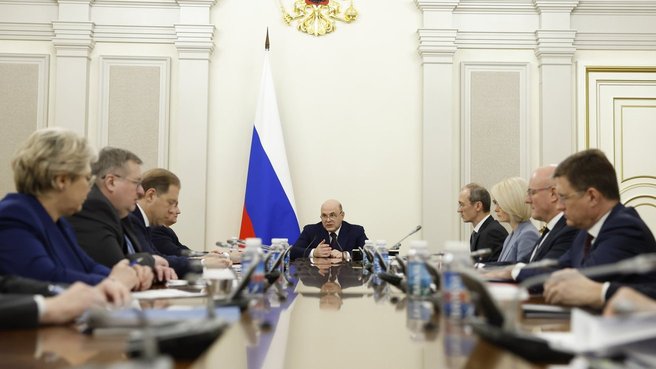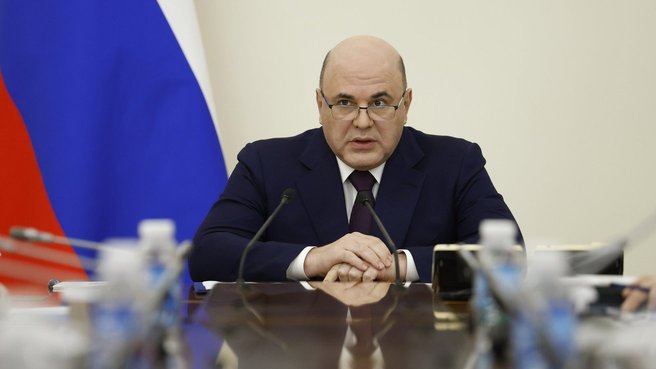Agenda: Reviewing the working visit to Azerbaijan, funding the social gas distribution programme, and extending the programme to identify and suppress cartel activity.
Mikhail Mishustin’s opening remarks:
Good afternoon, colleagues,
Last week during the visit to Baku, we discussed in detail the strengthening of Russian-Azerbaijani cooperation with President of Azerbaijan Ilham Aliyev and Prime Minister Ali Asadov. This was our first meeting after the presidential election and the appointment of the Cabinet of Ministers in Azerbaijan.
During the talks, we addressed the most important topics on the bilateral agenda. These include cooperation in energy, industry, transport infrastructure, agriculture, and pharmaceuticals. We agreed to intensify our work on joint projects and create the most comfortable and favourable conditions to attract mutual investment.
Particular attention was paid to developing the international North-South corridor, which runs through Azerbaijan.
In his Address to the Federal Assembly, the President emphasised that it is necessary to intensify our support for the international programmes to promote the Russian language and Russian culture. We raised these issues, as well as those related to expanding humanitarian ties, during a meeting with the representatives of public organisations as part of a visit to the Russian Drama Theatre in Baku.
Colleagues, please carefully monitor how the agreements reached with our Azerbaijani colleagues are being implemented in the areas under your supervision. Now, as for the decisions made.
We are actively implementing the social gas distribution programme, which was launched at the President’s instruction.
The total number of contracts concluded for the free individual gas connections to land plots exceeded 1.1 million. Of these, 900,000 have already been fully completed.
Overall, more than 90 percent of property owners asked for communications installations where it’s technically possible. This number is constantly growing, which shows the high demand for the programme throughout the country.
Owing to this programme, over half a million private houses have been connected to the gas system. This means a big increase in the quality of life and an improvement in the environmental situation due to the renunciation of stove heating. Now gas pipes will be laid to the property line, to a plot with a house in a gardening association on gasified residential land. This will concern many families that live in these gardening associations throughout the year. The President described this in detail in his Address to the Federal Assembly.
In addition to our work with the regions, we are also helping people receive subsidies for the purchase of the needed equipment and to pay for connecting it to the gas-distribution system. These subsidies are no less than 100,000 roubles.
On the President’s instructions, this support is granted to the participants in the special military operation and their family members, veterans of the Great Patriotic War, parents with many children and low-income people.
Last year, over 12,000 private households were connected to the gas system based on targeted payments. Now, we will allocate an additional 1 billion roubles for this purpose. These funds will be granted to low-budget regions. The relevant directive has been signed.
I would like to ask the regional governors to personally control social gas infrastructure development. Everything should be as convenient and clear to people as possible. It is necessary to help them undergo the formal procedures and promptly respond to their requests.
Now I’d like to talk about one more thing.
The President has set the goal of enhancing the competitive capacity of the domestic economy.
It is important to counter agreements that limit competition, decrease the quality of goods and services, and that lead to overpricing for both individuals and companies.
On instructions of the President, we have drafted an inter-departmental programme for identifying and eradicating these cartels. In the five years of its existence, the number of such violations has been reduced by three times. We will extend this roadmap to 2028.
We will concentrate on digitising methods of countering illegal practices, including the introduction of an anti-cartel information system. This development by our domestic experts will automatically identify violations of anti-monopoly legislation.
Those who voluntarily report on an anti-competitive practices should be entitled to leniency or exemption procedures.
We hope this will enhance the efficiency of competition and make pricing formation more fair.
Mr Belousov, recently I discussed this situation in detail with Head of the Federal Antimonopoly Service Maxim Shaskolsky. This service has all the necessary instruments and authority for reaching the goals, but it is necessary to use them more intensively. I would like to ask you to join these efforts as well.














